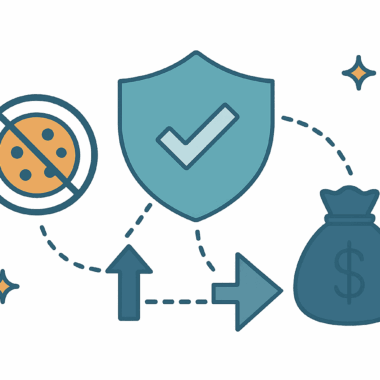

Affiliate Marketing Without Cookies: How to Future-Proof Your Program

Content:
- The End of Third-Party Cookies: What It Means for Affiliates
- First-Party Data as the New Foundation
- Privacy-First Tracking Technologies
- The Role of AI and Machine Learning in Attribution
- Building a Privacy-Ready Affiliate Strategy
- Future-Proof Commission and Attribution Models
- Conclusion
- Frequently Asked Questions (FAQ)
The gradual elimination of third-party cookies is transforming the foundation of digital marketing. As major browsers phase out traditional tracking mechanisms and global privacy regulations tighten, affiliate marketing programs are forced to innovate. The cookieless future is not a theoretical concept—it is an active shift that demands adaptation to protect accuracy, compliance, and profitability.
To remain competitive, brands must adopt privacy-first solutions that enable transparent data collection and precise attribution. The new paradigm emphasizes first-party relationships, server-side tracking, and consent-based engagement. This article explores how businesses can restructure affiliate marketing strategies to thrive without cookies while maintaining trust and performance integrity.
The End of Third-Party Cookies: What It Means for Affiliates
For years, affiliate networks relied on third-party cookies to monitor user actions across websites, attribute sales, and measure campaign effectiveness. These cookies allowed marketers to track click-to-conversion paths and allocate commissions accurately. However, this method has also raised major privacy concerns.
Browser developers such as Google and Apple have responded by phasing out cross-site tracking capabilities. This shift marks a turning point for affiliate programs that must now pivot toward transparent, user-consented methods of measurement. Failure to adapt will lead to attribution gaps, inaccurate reporting, and declining trust between affiliates, advertisers, and consumers.
Key consequences of cookie deprecation:
- Loss of third-party tracking accuracy
- Incomplete attribution data for conversions
- Stricter compliance requirements under GDPR and CCPA
- Increased importance of data consent and ownership
First-Party Data as the New Foundation
In the cookieless era, first-party data becomes the most valuable asset for affiliate marketers. This data is collected directly through owned properties—websites, mobile apps, or CRM systems—where the user willingly shares information. It provides a reliable and consent-based way to track engagement and attribute performance without violating privacy laws.
By integrating CRM systems, email databases, and login-based identifiers, brands can create a unified customer view that supports accurate attribution and deeper personalization. This transition empowers marketers to develop stronger relationships with consumers while maintaining control over data integrity.
First-party data advantages include:
- Compliance with international privacy standards
- Long-term data ownership and reliability
- Improved personalization through verified user profiles
- Greater transparency and trust between brand and customer
Privacy-First Tracking Technologies
As cookie-based tracking becomes obsolete, new technologies are emerging to ensure continuity in affiliate performance measurement. Among them, server-to-server (S2S) tracking has become the standard for privacy-first data exchange.
S2S tracking transfers conversion data directly between the advertiser’s and affiliate network’s servers, eliminating dependence on browsers and cookies. It provides greater accuracy, enhanced security, and compliance with consent-based frameworks. Other technologies, such as hashed identifiers and session-based tokens, further improve attribution without compromising user anonymity.
Key privacy-first tracking methods:
- Server-to-Server (S2S) tracking
- Hashed email or ID-based identifiers
- Consent Management Platforms (CMPs)
- API-driven attribution integrations
The Role of AI and Machine Learning in Attribution
The absence of cookies has accelerated the use of machine learning in marketing analytics. AI-powered algorithms can analyze patterns in first-party and contextual data to predict conversions and assign credit across touchpoints. This approach, known as probabilistic attribution, balances privacy with performance accuracy.
AI also enables predictive modeling to estimate customer lifetime value, forecast churn, and evaluate affiliate impact. Through behavioral clustering and pattern recognition, brands can identify which channels deliver the most sustainable engagement—even without direct user tracking.
Applications of AI in affiliate attribution:
- Predictive customer journey mapping
- Churn and retention analysis
- Probabilistic conversion modeling
- Optimization of commission structures
Building a Privacy-Ready Affiliate Strategy
Developing a cookieless affiliate strategy requires a complete reassessment of data collection and communication practices. Brands must ensure transparency at every stage of user interaction while maintaining performance efficiency.
Core steps for building a privacy-first affiliate framework:
- Audit existing tracking technologies for cookie dependency.
- Implement server-side tracking and CRM integrations.
- Educate affiliates on compliance and ethical data handling.
- Deploy consent management systems for user control.
- Create ongoing feedback loops with affiliate partners.
This proactive approach not only ensures compliance but also strengthens relationships between advertisers, affiliates, and consumers through transparency and accountability.
Future-Proof Commission and Attribution Models
In a cookieless environment, traditional last-click attribution becomes less reliable. Affiliate programs must shift to more comprehensive and flexible frameworks that recognize the complexity of modern customer journeys.
Models such as multi-touch attribution, event-based tracking, and engagement-weighted commissions provide fairer and more data-driven evaluations of performance. Hybrid approaches combining deterministic and probabilistic data create a balance between precision and privacy compliance.
| Attribution Model | Description | Best Use Case |
| Multi-Touch Attribution | Distributes credit across multiple touchpoints in the user journey. | Complex B2B or SaaS funnels |
| Event-Based Tracking | Assigns conversions based on specific actions rather than clicks. | E-commerce and gaming platforms |
| Probabilistic Modeling | Uses AI predictions to estimate conversions without direct identifiers. | Privacy-restricted markets |
Conclusion
Affiliate marketing is entering a new era where transparency and data ethics define success. The phase-out of cookies challenges established norms but also creates opportunities to adopt innovative, sustainable solutions.
By leveraging first-party data, implementing server-to-server tracking, and integrating AI-driven attribution, brands can future-proof their affiliate programs. Those who act early will not only comply with regulations but also build stronger, trust-based ecosystems for long-term growth.
Frequently Asked Questions (FAQ)
1. What is the main difference between first-party and third-party cookies?
First-party cookies are set directly by the website a user visits and are used for functionality and analytics. Third-party cookies are set by external domains and are primarily used for tracking across multiple sites.
2. How can affiliate marketers track conversions without cookies?
They can use server-to-server tracking, hashed identifiers, and first-party data integrations that connect CRM and campaign platforms.
3. Are cookieless tracking systems GDPR-compliant?
Yes, most modern tracking systems are built around user consent and data minimization, aligning with GDPR and CCPA principles.
4. What role does AI play in cookieless attribution?
AI supports probabilistic modeling, churn prediction, and revenue forecasting—helping brands maintain visibility without direct identifiers.
5. How can small affiliate programs transition effectively?
Start with CRM-based tracking, adopt lightweight S2S integrations, and partner with networks offering cookieless analytics solutions.

Does Affiliate Marketing Work for B2B? Enterprise Companies Winning with This Channel
B2B affiliate marketing is a performance-based strategy in which businesses partner with external publishers, influencers, or thought leaders to drive qualified leads and sales. Unlike B2C, where affiliates focus on consumer traffic and immediate purchases, B2B affiliates promote services or solutions aimed at other businesses—often involving longer sales cycles and higher-value transactions.

How to Launch a Profitable Casino Affiliate Program in 2025
This article explores a comprehensive framework for launching a successful casino affiliate program. It covers essential elements such as market research, software selection, commission modeling, compliance management, affiliate recruitment, and performance optimization. Each section is designed to help operators create a scalable, transparent, and profitable program aligned with the evolving regulatory and technological landscape of the iGaming sector.
Is Affiliate Marketing Legal?
Affiliate marketing has become as common as billboard advertising. It’s a staple diet in the digital landscape, offering individuals and businesses opportunities to generate income through online referrals and partnerships. However, amidst this wave, questions about its legality have arisen. Is affiliate marketing legal?



